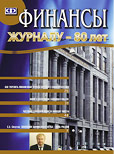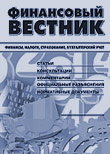Cодержание
Финансовая грамотность
А.А. Бокарев, директор Департамента международных финансовых отношений Минфина России
E-mail: d17@minfin.ru
В интервью А.А. Бокарев рассказал о том, кто может считать себя финансово грамотным человеком, по результатам исследований проанализировал уровень финансовой грамотности российских граждан, прокомментировал основные направления программы по повышению уровня финансовой грамотности населения и результат, который должен быть достигнут по ее завершению.
Ключевые слова: финансовая грамотность, «подушка безопасности», финансовый продукт, осознанный выбор, жизнь по средствам.
Финансы и бюджет: проблемы и решения
А.С. Чулков, заместитель начальника отдела сводного планирования департамента финансов Администрации МО «Город Краснодар», кандидат экономических наук
E-mail: achulkov@mail.ru
Квалифицированное управление государственным и муниципальным долгом, профессиональный учет рисков, выстроенная система управления обязательствами бюджетного сектора способствуют не только оптимизации управления бюджетами, но и позволяют строить и реализовывать стратегии развития территорий, а также стабилизируют финансовые рынки. В статье сделан вывод о том, что снижению долговой нагрузки на региональные и местные бюджеты бюджетной системы РФ путем активного практического внедрения модели ответственного управления долгом способствует соблюдение дополнительных ограничений размера заимствований. Проведенный анализ принципов, влияющих на выбор конкретных долговых инструментов может быть полезен в практическом планировании, исполнении бюджетов и контролю за их сбалансированностью.
Ключевые слова: бюджетная система, территориальные финансы, государственный и муниципальный долг, повышение эффективности расходов бюджета, программно-целевой метод управления, сбалансированность бюджета.
Казначейство: становление и развитие
В.И. Епифанова, руководитель Управления Федерального казначейства по Курской области
E-mail: svetlana0685@yandex.ru
В статье рассматривается учет бюджетных обязательств, как еще одна ступень развития казначейских технологий, позволяющих своевременно и в полном объеме осуществлять процедуры планирования и исполнения бюджетов бюджетной системы РФ по расходам, а также сделать прозрачными и доступными для общественного контроля все расходы получателей средств соответствующих бюджетов.
Ключевые слова: бюджетные обязательства, лимит бюджетных обязательств, учет бюджетных обязательств.
Налоги: теория и практика
В.А.Кашин, государственный советник налоговой службы 2-го ранга
Д.К. Чукарин, эксперт-аналитик
E-mail: kashin5033108@mail.ru
Вмешательство налоговых органов в вопросы ценообразования частных предприятий – отчетливая тенденция последнего времени. Кроме корректировки цен для сделок между взаимосвязанными предприятиями, это и регулирование цен и прибылей при выполнении госзаказов, и контроль за тарифами естественных монополий, и применение «предписанных» (справочных) цен при экспорте отдельных видов сырья и т.д. Однако помнить о том, что всякий дополнительный контроль неизбежно ухудшает конкурентные позиции данной страны и ее компаний на мировом рынке.
Ключевые слова: трансфертное ценообразование, фискальная выгода, международные налоговые проверки компаний, налоговая амнистия.
А.Б. Золотарева, заведующая лабораторией экспертизы законодательства Института прикладных экономических исследований (ИПЭИ) Российской академии народного хозяйства и государственной службы при Президенте РФ, руководитель научного направления «Правовые исследования» Института экономической политики им. Е.Т.Гайдара, кандидат юридических наук
E-mail: zolot@iep.ru
Т.А. Малинина, заведующая лабораторией налоговой политики Института экономической политики им. Е.Т. Гайдара
E-mail: tatiana.amadiss@gmail.com
В последние годы в России заметно усилилось внимание государства к некоммерческим организациям, что выразилось, в частности, в предоставлении им бюджетной поддержки и дополнительных налоговых льгот, включая нулевую ставку по налогу на прибыль для организаций образования, здравоохранения и социального обслуживания. Тем не менее, отечественное законодательство по вопросам налогообложения некоммерческих организаций имеет ряд пробелов, в части подоходного налогообложения НКО, которые авторы статьи предлагают заполнить. В статье дан сравнительный анализ подходов к налогообложению НКО в России, США и Франции, а также рекомендации по оптимизации российского законодательства.
Ключевые слова: некоммерческие организации, налогообложение НКО, налоговые льготы, налог на прибыль, положительные экстерналии.
Н.С. Милоголов, научный сотрудник Центра налоговой политики НИФИ Минфина России, кандидат экономических наук
E-mail: NMilogolov@nifi-abik.ru
К.Н. Церенова, научный сотрудник Центра налоговой политики НИФИ Минфина России, кандидат экономических наук
Излагаются итоги круглого стола, проведенного департаментом налоговой и таможенно-тарифной политики Минфина России и НИФИ совместно с российским отделением Международной налоговой ассоциации (Рос-ИФА) на тему «Новации законодательства о правилах налогообложения контролируемых иностранных компаний и добровольном декларировании активов». Эксперты обсудили изменения, внесенные в антиофшорные статьи Налогового кодекса, касающиеся налогообложения прибыли КИК.
Ключевые слова: деофшоризация, контролируемые иностранные компании, декларирование активов.
Страхование
Е.Ф. Дюжиков, доцент кафедры «Страховое дело» Финансового университета при Правительстве РФ, кандидат экономических наук
E-mail: dujikov@bk.ru
В связи с созданием Евразийского экономического союза (ЕАЭС) большую актуальность приобретают предпринимаемые и запланированные шаги, направленные на формирование единого страхового рынка. Среди них важное значение имеет гармонизация государствами требований по порядку и условиям создания и лицензирования страховой деятельности. Предлагается согласовать общие минимальные требования к лицам, претендующим на получение лицензии на страховую деятельность, что позволит страховщикам, получившим лицензию в своей стране, работать и в других государствах. Такие же требования следует разработать и для страховых брокеров.
Ключевые слова: лицензирование, страховая деятельность, гармонизация законодательства, единый страховой рынок, страховщики, брокеры.
Э.С. Гребенщиков, кандидат исторических наук
E-mail: Finance-journal@mail.ru
В материале подводятся предварительные итоги (премии, выплаты, количество заключенных договоров) страхования ответственности застройщиков и долевого строительства в России, осуществляемого в основном специализирующимся на этом виде обществом взаимного страхования. Автор дает объяснение тому, почему коммерческие страховщики воздерживаются от активного участия в реализации статьи 15.2 Закона № 214-ФЗ, которая предусматривает страхование такого риска как «неисполнение обязательств застройщика по передаче жилого помещения участнику долевого строительства». Также раскрываются особенности процесса андеррайтинга в этом виде страхования и его статистического обеспечения.
Ключевые слова: андеррайтинг, коммерческие страховщики, ОВС, долевое строительство, неисполнение договорных обязательств, страхование как форма гарантии.
О.Г. Журавлева, студентка Мордовского государственного университета им. Н. П. Огарева
E-mail: olga.zhuravleva.92@mail.ru
Ю.Ю. Филичкина, доцент кафедры финансов и кредита Мордовского государственного университета им. Н. П. Огарева, кандидат экономических наук
Обязательное страхование гражданской ответственности владельцев автотранспортных средств (ОСАГО) является важным сегментом страхового рынка Республики Мордовия. Авторы рассматривают состояние данного рыночного сегмента, анализируют основные показатели деятельности региональных страховщиков. Обозначены ряд проблем и пути совершенствования законодательного регулирования ОСАГО на федеральном уровне.
Ключевые слова: автострахование, страховщик, страховые премии, страховые выплаты, коэффициент выплат, система «бонус-малус», убыточность.
Финансовый контроль и аудит
Ю.П. Никольская, доцент, профессор кафедры бухгалтерского учета и аудита Московского университета МВД имени В.Я. Кикотя, кандидат экономических наук
E-mail: nikolska@list.ru
Контроль является одной из важнейших функций управления, как на уровне экономического субъекта, так и на уровне государства и от эффективности организации внутреннего и внешнего финансового контроля во многом зависит дальнейший экономический рост. Автор рассматривает проблемы современного финансового контроля, затрагивает вопросы внутреннего финансового контроля и внутреннего финансового аудита в государственном секторе, а также проблемы организации внутреннего контроля, осуществляемого в соответствии с Федеральным законом «О бухгалтерском учете». Уделено внимание и вопросам внешнего финансового контроля, в том числе и результативности внешнего финансового аудита, осуществляемого Счетной палатой РФ.
Ключевые слова: финансовый контроль, аудит, внутренний финансовый контроль, государственный аудит, внутренний финансовый аудит.
Корпоративные финансы
Н.И. Кузнецов, докторант Финансового университета при Правительстве РФ, кандидат технических наук
И.Я. Лукасевич, Финансовый университет при Правительстве РФ, доктор экономических наук, профессор
E-mail: lukas1963@yandex.ru
В статье излагается сущность предлагаемого авторами концептуального подхода к реализации комплексных финансовых моделей управления деятельностью предприятий реального сектора. Приводятся формулировки уравнений модели для блока «управление финансовой деятельностью» и описание входных параметров и выходных показателей, а также возможных ограничений. Даются авторские рекомендации по разработке и применению подобных моделей на практике.
Ключевые слова: финансы предприятий, финансовый менеджмент, моделирование, хозяйственная деятельность, прогнозирование.
Из истории финансов
О.А. Антонюк, заведующий кафедрой финансов и управления банковской деятельностью в Вооруженных Силах Военного университета Министерства оборона РФ, доктор экономических наук, профессор, заслуженный экономист РФ
E-mail: pr.antonjuk@mail.ru
Ю.А. Лебедев, директор Музея Финансового университета при Правительстве РФ, кандидат исторических наук
В статье кратко очерчена почти вековая история подготовки офицерских кадров для финансовой службы Вооруженных Сил в военно-учебных заведениях нашей страны. Их выпускники на протяжении десятилетий успешно руководили финансово-экономической службой Вооруженных Сил, занимали другие ответственные должности в различных финансовых органах страны. После проведения военной реформы традиции военно-финансовых ВУЗов продолжает Военный университет МО РФ. Его финансово-экономический факультет, готовит специалистов не только для Министерства обороны РФ, но и для других силовых ведомств, а также армий других государств.
Ключевые слова: Финансово-экономическая служба Вооруженных Сил; подготовка военных финансистов; военно-финансовые учебные заведения, традиции военно-финансовых ВУЗов, Военный университет МО РФ.
Г.В. Носова, научный сотрудник 1 категории Государственного исторического музея, кандидат исторических наук
Тел.: 915-342-92-88
В статье рассматриваются меры, которые принимались Министерством финансов при министрах Е.Ф. Канкрине и Ф.П. Вронченко для стимулирования развития отечественной промышленности. Оценивается эффективность этих мер и показан результат, к которому они привели.
Ключевые слова: промышленное развитие, протекционизм, налоги, тарифы.
Финансы зарубежных стран
Е.А. Юдин, старший научный сотрудник Научно-исследовательского финансового института Минфина России, кандидат экономических наук
E-mail: eyudin@nifi.ru
Долгосрочные финансовые прогнозы имеют большое значение для развития социально-экономической системы развитых стран мира. Данные этих прогнозов дают основание для рассмотрения устойчивости текущей финансовой политики в течение длительного периода времени. Получение необходимых показателей возможно при моделировании будущих государственных доходов и расходов в зависимости от ряда определенных демографических, макроэкономических и других предположений. В статье анализируется опыт Германии по решению социальных и экономических проблем в связи с задачами бюджетного прогнозирования.
Ключевые слова: бюджетное прогнозирование, государственные доходы и расходы, демографические факторы, долгосрочные финансовые прогнозы, социально-экономические проблемы, финансовая устойчивость.
Научные исследования аспирантов и соискателей
Е.А.Еременко, аспирантка кафедры «Налоги и налогообложение», Финансовый университет при Правительстве РФ
E-mail: evgeniya_eremenko@mail.ru
Настоящая статья посвящена рассмотрению особенностей отдельных налоговых льгот и специальных налоговых режимов с точки зрения концепции справедливости в современном налогообложении. Автор полагает, что сама концепция налоговых льгот противоречит идее и понятию налоговой справедливости. Также рассматривается вопрос о круге пользователей специальных налоговых режимов внесении изменений в законодательство о налогах и сборах.
Ключевые слова: налоговые льготы, специальные налоговые режимы, принцип справедливости налогообложения, эффективность и справедливость.
Annotation
A.A. Bokarev, director of Department of International financial relations of the Ministry of Finance of Russia
E-mail: d17@minfin.ru
In an interview A.A. Bokarev told who can consider themselves as financially literate persons, according to the results of surveys analyzed the level of financial literacy of Russian citizens, commented on the main directions of program on improving financial literacy of population and result that should be achieved on its completion.
Keywords: financial literacy, “airbag”, financial product, informed choice, living within your means.
A.S. Chulkov, Ph.D., deputy chief of integrated planning division of the finance department of the municipal administration of Krasnodar
E-mail: achulkov@mail.ru
Qualified management of state and municipal debt, a professional risk-management system built by the public sector obligations contribute not only to optimize the management of the budget but also allow you to build and implement the strategy development of the territories, as well as to stabilize financial markets. The article concluded that the reduction of the debt burden on state and local budgets of the budgetary system of the Russian Federation through active practical implementation of the model of responsible debt management contributes to compliance with the additional restrictions borrowings. The analysis of the principles that influence the choice of specific debt instruments may be useful in practical planning, budget execution and control over their balance.
Keywords: budget system, territorial finance, state and municipal debt, improve the efficiency of budget expenditures, program-target method of management, balanced budget.
V.I. Epifanova, head of the Administration of Federal Treasury across the Kursk region
E-mail: svetlana0685@yandex.ru
Article considers accounting of budget obligations as one more stage of development of treasury technologies that allow implementing the procedures of planning and execution of budgets of budgetary system of the Russian Federation on expenditure side fully and in time, make all expenditures of recipients of funds of the respective budgets transparent and available for public control.
Keywords: budget commitments, limit of budget commitments, accounting of budget commitments.
V.I. Epifanova, V.A. Kashin, state councilor of the Tax service of 2nd rank
D.K. Chukarin, expert – analytic
E-mail: kashin5033108@mail.ru
Intervention of the tax bodies in the questions of pricing of private companies is a clear tendency recently. In addition to prices correction for transactions between interconnected enterprises it is regulation of prices and profits during implementation of state contracts, control over tariffs of natural monopolies, use of “prescribed” (reference) prices during export of separate kind of raw materials and etc. However it is necessary to remember that each additional control will inevitably make worse competitive positions of the country and its companies on the global market.
Keywords: transfer pricing, fiscal benefit, international tax audit of companies, tax amnesty.
A.B. Zolotareva, head of the laboratory of legislation expertise of the Institute for Applied Economic Studies (IAES) of the RANEPA, head of scientific direction “Legal researches” of the Gaidar Institute for Economic Policy, candidate of legal sciences
E-mail: zolot@iep.ru
T.A. Malinina, head of the laboratory of tax policy of the Gaidar Institute for Economic Policy.
E-mail: tatiana.amadiss@gmail.com
Attention of the state to non – profit organizations increased in the recent years in Russia which resulted in particular in provision of budget support and additional tax benefits to non – profit organizations including zero tax profit rate for organizations of education, health and social services. However the domestic legislation on questions of taxation of non – profit organizations has a number of gaps in terms of income taxation of NPO, authors propose to fill these gaps. Article provides comparative analysis of approaches to taxation of NPO in Russia, USA and France, as well as recommendations on optimization of the Russian legislation.
Keywords: non – profit organizations, taxation of NPO, tax benefits, profit tax, positive externalities.
N.S. Milogolov, research officer of the Tax policy Center of the Financial Research Institute of the Ministry of Finance of Russia, candidate of economic sciences.
E-mail: NMilogolov@nifi-abik.ru
K.N. Tserenova, research officer of the Tax policy Center of the Financial Research Institute of the Ministry of Finance of Russia, candidate of economic sciences
Article provides the results of round table held by the Department of tax and customs – tariff policy of the Ministry of Finance of Russia and Financial Research Institute together with Russian branch of the International tax association (Ros - IFA) on the theme: “Innovations of the law on the rules of taxation of controlled foreign companies and voluntary declaring of assets”. Experts discussed the changes made in anti – offshore articles of the Tax code relating to the taxation of profits of controlled foreign companies.
Keywords: de-offshorization, controlled foreign companies, declaring of assets.
E.F. Dujikov, associate professor of chair “Insurance business” of the Financial University under the Government of the Russian Federation, candidate of economic sciences
E-mail: dujikov@bk.ru
In connection with the establishment of the Eurasian Economic Union the ongoing and planned steps towards the formation of the united insurance market become especially relevant. Among these steps, the harmonization of the States requirements to the procedure and conditions for the establishment and licensing of insurance activity is very important. It is proposed to agree on common minimum requirements for persons applying for a license for insurance activity. This will allow insurers licensed in their country, to work in other States. The same requirements should be developed for insurance brokers.
Keywords: licensing, insurance activities, harmonization of legislation, united insurance market, insurers, brokers.
E.S. Grebenschikov, candidate of historical sciences.
E-mail: Finance-journal@mail.ru
The article sums up preliminary results of the developers liability insurance in Russia, hidden perils of the underwriting process, input of commercial insurers and mutual society which specializes on this class of insurance business and so far controls the lion’s share in this segment of the insurance market. Supervisory authority believes that so far the process of insurance of investors and construction industry risks is progressing and is avoiding major failures.
Keywords: underwriting, commercial insurers, provident society, shared construction, non – execution of contractual obligations, insurance as a form of guarantee.
O.G. Zhuravleva, student of N. P. Ogarev's Mordovian State University
E-mail: olga.zhuravleva.92@mail.ru
J.Y. Filichkina, associate professor of chair “Finance and credit” of the N. P. Ogarev's Mordovian State University, candidate of economic sciences
Compulsory insurance of civil liability of owners of vehicles is an important segment of the Russian insurance market, which in recent times is a valid topic for discussion. In this article, the authors assessed the status of the CTP market in the Republic of Mordovia, analyzes the main indicators of activities of the regional insurers. The study identifies current issues and suggests ways to improve compulsory third party liability insurance
Keywords: insurance, insurer, insurance premiums, insurance payments, payout ratio, the system of "bonus-Malus", unprofitableness.
Y.P. Nikolskaya, associate professor, professor of chair “Accounting and audit” of the Moscow University of Ministry of Internal Affairs of Russia named after V.Y. Kikot, candidate of economic sciences
E-mail: nikolska@list.ru
Control is one of the most important functions of management, both on the level of economic subject and on the state level and further economic growth in many respects depends on the efficiency of organization of internal and external financial control. Author considers the problems of modern financial control, touches upon questions of financial control and internal financial audit in the state sector, and also problems of organization of internal control carried out in accordance with the Federal Law on “Accounting”. Article focuses attention on questions of external financial control including the efficiency of external financial audit carried out by the Accounts Chamber of the Russian Federation.
Keywords: financial control, audit, internal financial control, state audit, internal financial audit.
N.I. Kuznetsov, doctoral student of the Financial University under the Government of the Russian Federation, candidate of technical sciences
I.Y. Lukasevich, Financial University under the Government of the Russian Federation, doctor of economic sciences, professor
E-mail: lukas1963@yandex.ru
Article describes the essence of conceptual approach to implementation of the complex financial models of management of activities of real sector enterprise proposed by the authors and provides the formulations of equations of models for block “management of financial activities” and description of the input parameters and output indicators, and also possible limitations. Author’s recommendations on development and application of such models in practice are given.
Keywords: finance of enterprise, financial management, modeling, operations, forecasting.
O.A. Antonjuk, head of chair of Finance and management of banking activities in the Armed Forces of the Military University of the Ministry of Defense of the Russian Federation, doctor of economic sciences, professor, honored economist of the Russian Federation
E-mail: pr.antonjuk@mail.ru
Y.A. Lebev, director of the Museum of the Financial University under the Government of the Russian Federation, candidate of historical sciences.
E-mail: lukas1963@yandex.ru
Article briefly outlines the nearly a century history of training of officers for financial service of the Armed Forces in military educational institutions of our country. Their graduates for decades successfully managed financial and economy services of the Armed Forces and held other senior positions at various financial institutions of the country. After the military reform Military University of the Ministry of Defense of the Russian Federation continues traditions of the military - financial institutions. Its financial – economic faculty trains specialists not only for the Ministry of Defense of the Russian Federation but also for other force authorities and armies of other states.
Keywords: Financial – economic service of the Armed Forces, training of military financiers, military financial institutions, tradition of military – financial institutions, Military University of the Ministry of Defense of the Russian Federation.
G.V. Nosova, research officer of the first category of the State Historical Museum, candidate of historical sciences.
+7 915-342-92-88
Article considers the measures taken by the Ministry of Finance under the ministers E.F. Kankrin and F.P. Vronchenko for stimulation of domestic industry development. Efficiency of these measures is assessed and achieved result is shown.
Keywords: industrial development, protectionism, taxes, tariffs.
E.A. Yudin, senior research officer of the Research Financial Institute of the Ministry of Finance of Russia, candidate of economic sciences
E-mail: eyudin@nifi.ru
Long-term fiscal projections are of great importance for the development of socio-economic system of the developed world. Data from these projections provide a basis for the consideration of the sustainability of current fiscal policy for a long period. Obtaining the necessary parameters is possible in the simulation of future government revenues and expenditures, depending on the number of certain demographic, macroeconomic and other assumptions. The article analyzes the German experience to address social and economic problems in connection with the objectives of budget forecasting.
Keywords: budget forecasting, government revenues and expenditures, demographic factors, long-term fiscal projections, socio-economic problems, fiscal sustainability.
E.A. Eremenko, postgraduate student of chair “Tax and taxation” of the Financial University under the Government of the Russian Federation
E-mail: evgeniya_eremenko@mail.ru
The article is devoted to peculiarities of some tax exemptions and special tax treatments as particular instruments implementing the concept of equity in the modern taxation. The author considers some problems of understanding of tax benefits as instruments of tax regulation, citing the arguments that consideration of tax benefits as such are often not consistent with the concept of tax equity. Also the author considers the problem of users of special tax treatments, offering to introduce innovations in the tax legislation, with the aim of restoring tax equity.
Keywords: tax benefits, special tax treatments, principle of tax equity, efficiency and equity.













